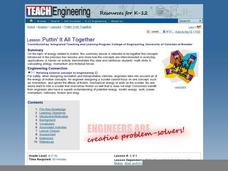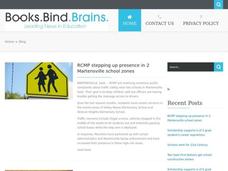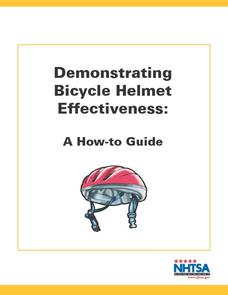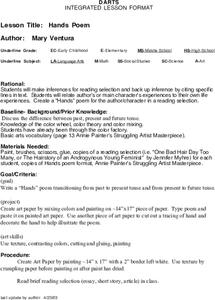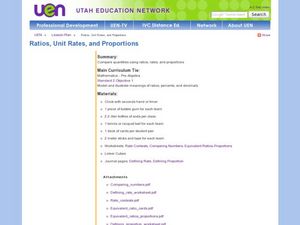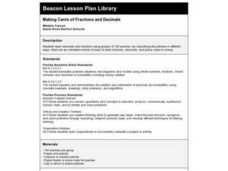Curated OER
The Real World Revisited
Class members participate in a series of hands on, online, and multimedia activities to identify the difference between primary and secondary sources. They watch a related video and visit a variety of sites to locate primary and...
Curated OER
Shapes
Learners participate in a number of hands-on shape-related activities. They match and sort shapes by attribute, read books about shapes, complete shape art projects and explore and compare parts of shapes.
Curated OER
Puttin' It All Together
Pupils explain the concepts of kinetic and potential energy and how it can change forms. In this energy, motion, and frictional forces instructional activity students participate in a hands on activity that includes calculating energy.
Curated OER
What Wavelength Was That?
A combination of informative text, photos, and graphics comprise this sharp show on electromagnetic radiation. Some slides mention hands-on activities for demonstrating concepts, so if you want to include them you will need to figure out...
Curated OER
Three-Digit Addition and Subtraction With Regrouping
Second graders access prior knowledge of addition and subtraction using two-digit numbers and calculate easily with them. In this three-digit addition lesson, 2nd graders learn to add and subtract three-digit numbers with and without...
Curated OER
How Many More on a Graph?
First graders identify a number that is one more or one less than a number up to one hundred and identify a mystery number. They also create a class graph that illustrates how many children are in each family, and answer questions about...
Curated OER
Hide the Beans
In this subtraction learning exercise, students use a spinner to spin to a number between 1 and 9. Students draw that number on the picture of the open hand. Students then find out how many beans are in the other hand by subtracting to...
Curated OER
Yuckiest Site on the Internet
Students investigate the worm and the cockroach. In this organisms lesson, students visit suggested websites to identify the characteristics of worms and cockroaches. Students dissect a worm and observe a live cockroach. Students report...
Curated OER
Interesting Integers
Students add and subtract integers. In this algebra lesson, students analyze integers using hands on manipulative. They solve problems of addition and subtractions using their signs correctly. They play a game of cards to reinforce the...
Council for Economic Education
GDP Data: Is the Economy Healthy?
Does the economy needs a check-up? Scholars analyze the gross domestic product (GDP) to determine the overall health of the current economy. They use a short video clip as well as economic data to determine the current growth of the...
West Contra Costa Unified School District
Adding by finding 10's
Count with ten frames in a first grade addition lesson. Kids determine how to identify numbers on a number line, as well as with ten frames, and complete ten frames to show their answers in several addition problems.
Teach Engineering
May the Force Be With You: Drag
Do not let friction drag you down! The 11th segment in a series of 22 focuses on the fourth force acting upon an airplane—drag. Pupils learn about the effects and causes of drag.
National Highway Traffic Safety Administration
Demonstrating Bicycle Helmet Effectiveness
A well-fitting helmet can be the difference between an unfortunate bicycle accident and a tragic bicycle accident. Encourage your class to exercise bike safety with a set of lessons that demonstrate the importance of wearing a helmet,...
Teach Engineering
Rock and Boat
Present the class with a question on whether the water level of a pond will rise they take a large rock out of a boat and drop it into the pond. Groups come down on all sides of the question and try to justify their answers. The activity...
Teach Engineering
Coordinates and the Cartesian Plane
The plot thickens to get a functional understanding. After a short review of plotting points on the coordinate plane, class members learn the difference between functions and relations in the second lesson in a series of nine. They show...
Science Matters
Energy Transfer and Transformation
When you take a simple task and create an exceptionally difficult way to complete it, it is known as a Rube Goldberg machine. These machines are filled with many types of energy transfers and energy transformations. Here, pupils watch...
Savvas Learning
Saxon Math 5/4
You'll never have to search for another worksheet again after downloading this extensive collection of Saxon math materials. With over 600 pages of example problems and skills practice exercises, this is a must-have resource for any...
Curated OER
Hands Poem
Learners create a "Hands" poem for the author/character in a reading selection.They make inferences for reading selection and back up inference by citing specific lines in text. They relate author's or main character's experiences to...
Coastal Carolina University
Osmosis and Diffusion Lab: Honey I Blew Up the Bear
Beginning biologists explore passive transport through two demonstrations and a hands-on inquiry. Spray air freshener from one spot in the classroom and have class members raise their hands as the scent reaches them. Also, place a teabag...
Curated OER
Ratios, Unit Rates, and Proportions
Explore the concept of ratios, unit rates, and proportions. Learners convert fractions and percents to decimals. They discuss rates and where they can be found in the real world. A hands-on experiment and numerous flash cards and...
Curated OER
Making Cents of Fractions and Decimals
Students explore decimals and fractions using groups of 100 pennies. By classifying the pennies in different ways, there are an unlimited number of ways to learn fractions, decimals, and place value in money. This is a good, hands-on...
Curated OER
Addition and Subtraction Facts To 20
First graders use manipulatives, flash cards, number sentences and story problems to practice their addition and subtraction facts to twenty.
EngageNY
Polynomial, Rational, and Radical Relationships
This assessment pair goes way beyond simple graphing, factoring and solving polynomial equations, really forcing learners to investigate the math ideas behind the calculations. Short and to-the-point questions build on one another,...
Bethel School District
Observations and Inference
What's the difference between qualitative and quantitative observations? Learners make observations, inferences, and predictions about their environment with a set of questions and activities that are applicable to either language arts...




